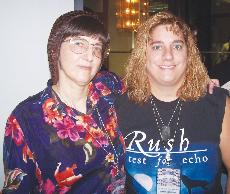Professor Donna Halper may seem like another new face to the community of UMass Boston, having just been hired to teach in the Communications Studies program starting last Fall, but she taught here several years ago in CPCS and American Studies. Mrs. Halper has been to places, and had career achievements that some people could only dream of. People who know her story realize that none of it was easy, not in the slightest.
It all started in the late 1960s at Northeastern University, where it took four years for a young Ms. Halper to broadcast on-air at the college station. Mrs. Halper became the first female on-air broadcaster in the school’s history in October, 1968. Professor Halper remembers, “When I graduated, I found a lot of doors were still closed to me. So I kept fighting for the right to follow my dream.”
Donna eventually got her Bachelor’s and Master’s degrees in English, and another Master’s in Counseling at NU, but the next broadcasting opportunity did not come to her until a Cambridge station (WCAS) gave her the afternoon drive slot in 1973. Then one day she got a call that would change her life forever. A Program Director from Cleveland’s WMMS-FM happened to be in Boston visiting relatives when he heard Donna’s show. He offered her a full-time radio job. She left for Cleveland immediately. “It was scary and it was a risk, but I felt I had to do it,” says Halper.
From there, the rest is history. As the music director at her new job, Ms. Halper picked the albums for WMMS airstaff to play. Then, one day in 1974, she struck gold. A Toronto hard rock band that wasn’t getting any attention back home suddenly found their music being played on US radio for the first time. It was WMMS, under Halper’s direction. The band was RUSH, a legendary rock trio, whose career then took off because Donna Halper believed in them and their music. In fact, as a thank you RUSH dedicated their first two records to her.
Needless to say, this was the highlight of Halper’s young career. Her lowpoint? Halper was fired from a Long Island station because she DIDN’T smoke weed! Remarkably, Halper says she has not, to this day, had a drink or a drug in her life even though she grew up and worked around it.
Radio broadcasting may have brought her fame, but Donna’s later work was even more rewarding. For the past 15 years, Professor Halper has been teaching in the Journalism and Liberal Arts areas of Emerson College, where she won the “Instructor of the Year” award in 1995. She’s a two-time finalist for a Distinguished Teaching Award at Umass-Amherst (including this year), where she also teaches Media Ethics and is studying for her Ph.D. in Communications. Halper also taught at Curry College in the past year. In addition, Professor Halper has free-lanced for Quincy’s The Patriot Ledger newspaper for three years, writing about subjects like education and religion.
Coming from a Jewish background, Halper always believed in what she calls performing a “mitzvah,” a good deed that makes the world a better place. She’s very proud of her volunteer work, having been a Big Sister and a mentor to people, including to an autistic adult named Jeff since 1984. Though doctors believed Jeff would never talk, he now knows 300 words. His first sentence was “I love you, Donna.” Once told she was too smart to get a husband, Halper says it was Jeff who first brought her husband and her together. Not bad for a woman who grew up being told more of what she couldn’t do than what she could. Women in her day were stereotyped and restricted in career choices, but she fought through it by never giving up her dreams and taking advantage of opportunities that came her way.
In her spare time, Donna has personal hobbies like collecting old magazines, stamps, media history books and post-cards. Other notable career highlights: she has appeared on ABC’s Nightline, the History Channel, and local TV shows she’s written articles for magazines and encyclopedias, and three books, the latest of which is called Invisible Stars: A Social History of Women in American Broadcasting.





















































